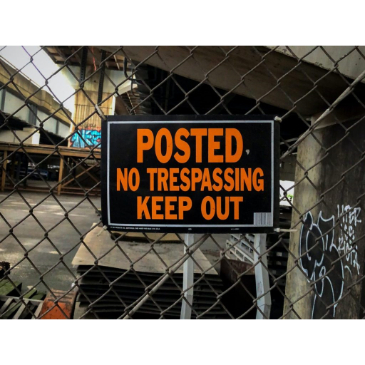The term “trespass” is defined as “knowingly entering another owner’s property or land without permission, which encroaches on the owner’s privacy or property interests,” according to Cornell Law School Legal Information Institute (LII). Under Colorado law, there are three different degrees of criminal trespass, with widely ranging severity of penalties. Each degree of criminal trespass has its own definition.
First Degree Criminal Trespass
 As stated in the Colorado Revised Statutes at section 18-4-502, “A person commits the crime of first degree criminal trespass if such person knowingly and unlawfully enters or remains in a dwelling of another or if such person enters any motor vehicle with intent to commit a crime therein.” This offense may be charged as a class 1 misdemeanor, punishable by up to 12 months in jail and a fine of up to $1,000. If the crime involves an occupied or inhabited dwelling, however, it is charged as a class 6 felony, which carries penalties including up to 18 months in prison and a fine of $1,000 to $100,000.
As stated in the Colorado Revised Statutes at section 18-4-502, “A person commits the crime of first degree criminal trespass if such person knowingly and unlawfully enters or remains in a dwelling of another or if such person enters any motor vehicle with intent to commit a crime therein.” This offense may be charged as a class 1 misdemeanor, punishable by up to 12 months in jail and a fine of up to $1,000. If the crime involves an occupied or inhabited dwelling, however, it is charged as a class 6 felony, which carries penalties including up to 18 months in prison and a fine of $1,000 to $100,000.
Second Degree Criminal Trespass
This offense is defined at CRS 18-4-503 as follows:
“A person commits the crime of second-degree criminal trespass if such person:
- Unlawfully enters or remains in or upon the premises of another which are enclosed in a manner designed to exclude intruders or are fenced; or
- Knowingly and unlawfully enters or remains in or upon the common areas of a hotel, motel, condominium, or apartment building; or
- Knowingly and unlawfully enters or remains in a motor vehicle of another.”
Penalties for second-degree criminal trespass can vary depending on the circumstances. In some cases, it may be prosecuted as a petty offense with maximum penalties of up to 10 days in jail and up to $300 in fines. When a person knowingly and unlawfully enters or remains in someone else’s vehicle, this crime may be charged as a class 2 misdemeanor, carrying penalties of up to 120 days in jail and/or up to $750 in fines. A person accused of trespassing on a premises that has been classified as agricultural land with the intent to commit a felony may face a potential prison sentence of two to six years and/or a fine of $2,000 to $500,000.
Third Degree Criminal Trespass
Criminal trespass in the third degree is unlawfully entering or remaining in or upon the premises of another. It is usually a petty offense that carries penalties of up to 10 days in jail and up to $300 in fines. If the crime is committed on agricultural land with the intent to commit a felony, it is charged as a class 5 felony, punishable by a prison term of one to three years and/or a fine of $1,000 to $100,000.
What Are the Legal Defenses Against Criminal Trespass Charges?
Defenses our Colorado Springs criminal defense attorney will raise will depend on the charges and circumstances in your case. Common criminal trespass defenses include:
- Implied or express consent – permission from the owner to be on the premises
- Property rights – a lawful right to be on the property
- Lack of knowledge of entering private property or agricultural land
- Lack of intent to commit a crime
If you are facing criminal trespass charges in Colorado, it is in your best interests to speak with an experienced lawyer. Skilled legal defense can give you a better chance of obtaining the best possible outcome in your case.
At The Bussey Law Firm, P.C., we provide top legal representation to our clients. We have a proven track record and years of experience. Contact us at (719) 475-2555 for proactive criminal defense.
